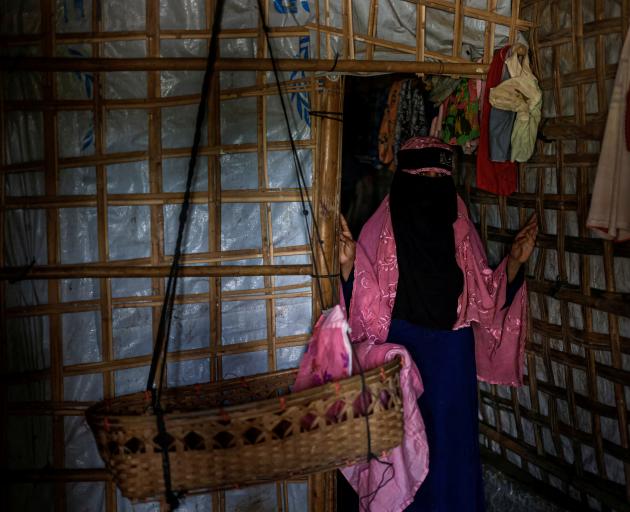Lifestyle
Education Crisis Deepens for Rohingya Children in Bangladesh

The closure of schools for Rohingya refugee children in Cox’s Bazar has left over 227,500 students without education, putting their future at risk. As international aid dwindles, families fear for the safety and well-being of their children in an environment rife with uncertainty.
Bangladesh is home to approximately 1.2 million Rohingya refugees, with half of them being children. Many fled a brutal military crackdown in Myanmar, which the United Nations has described as a “textbook example of ethnic cleansing.” With the eighth anniversary of their displacement approaching on August 25, 2023, the humanitarian situation has become increasingly dire.
Since June, UNICEF has suspended operations at more than 4,500 learning centers in the camps, leaving thousands of children without access to basic education. This drastic measure is a result of a significant funding shortfall, driven in part by changing global priorities and a reduction in international aid. The UN Refugee Agency (UNHCR) estimates it requires US$256 million to support the displaced Rohingya this year but has only received commitments for about 38% of that amount.
“Essential services and lifesaving assistance for the whole Rohingya refugee population are at risk of collapsing,” warned Juliette Murekeyisoni, interim UNHCR Representative in Bangladesh. The lack of funding threatens critical food assistance, healthcare, and educational resources.
In the refugee camps, the impact of school closures is palpable. Begum, a mother of five, expressed her fears for her 16-year-old daughter’s future. “Without school, girls sit idle. People start talking,” she said, as her toddler tugged at her headscarf. Her husband struggles with mental health issues, and she worries that early marriage may be the only option for her daughter.
The situation is echoed by other parents in the camps. Mohammed Faruq, who fled Myanmar in 2017, lamented, “Only a little bit of education our children could learn was snatched away. We survived genocide in Myanmar, but now our children’s future is being killed silently.”
According to the International Rescue Committee (IRC), no Rohingya child under the age of 12 currently has access to education in Cox’s Bazar. The IRC estimates that as many as 500,000 children are missing out on learning opportunities. This lack of education has serious consequences: reported cases of child marriage have risen by 3% this year, and child labor has increased by 7%.
Hasina Rahman, IRC’s Bangladesh director, warned that families are increasingly turning to desperate measures for survival. “Each day, more families will continue to turn to extreme methods of survival,” she said, highlighting the troubling trend of child marriage and forced labor.
The funding crisis has led to a reduction in UNICEF staff and a streamlining of programs, but the needs of the Rohingya community far exceed available resources. “To stretch every dollar, we have reduced UNICEF staff, streamlined programmes, and cut costs wherever possible,” said Rana Flowers, UNICEF Representative to Bangladesh. “But the needs far outweigh the resources available.”
As violence continues in Myanmar, the situation in Cox’s Bazar remains critical. Over the past 18 months, an additional 150,000 Rohingya have arrived, further straining already limited resources.
“I dreamed my students would become doctors or engineers. Now, with no classes, they will become nothing,” said Kafayat Ullah, a 45-year-old math teacher. His words resonate with many in the camps, where dreams of a better future are fading.
Nine-year-old Nahima Bibi, who once aspired to be a doctor, now spends her days playing in the muddy lanes of the camp. “If I don’t go to school, how will I ever become a doctor?” she asked softly, her disappointment evident.
The ongoing crisis for Rohingya children highlights the urgent need for increased international support and funding. Without immediate action, a generation of children may be lost to a future without education, hope, or opportunity.
-

 World4 months ago
World4 months agoTest Your Knowledge: Take the Herald’s Afternoon Quiz Today
-

 Sports4 months ago
Sports4 months agoPM Faces Backlash from Fans During Netball Trophy Ceremony
-

 Lifestyle4 months ago
Lifestyle4 months agoDunedin Designers Win Top Award at Hokonui Fashion Event
-

 Entertainment4 months ago
Entertainment4 months agoExperience the Excitement of ‘Chief of War’ in Oʻahu
-

 Sports4 months ago
Sports4 months agoLiam Lawson Launches New Era for Racing Bulls with Strong Start
-

 World5 months ago
World5 months agoCoalition Forms to Preserve Māori Wards in Hawke’s Bay
-

 Lifestyle4 months ago
Lifestyle4 months agoDisney Fan Reveals Dress Code Tips for Park Visitors
-

 Health4 months ago
Health4 months agoWalking Faster Offers Major Health Benefits for Older Adults
-

 Politics4 months ago
Politics4 months agoScots Rally with Humor and Music to Protest Trump’s Visit
-

 Top Stories5 months ago
Top Stories5 months agoUK and India Finalize Trade Deal to Boost Economic Ties
-

 Health2 months ago
Health2 months agoRadio Host Jay-Jay Feeney’s Partner Secures Visa to Stay in NZ
-

 World5 months ago
World5 months agoHuntly Begins Water Pipe Flushing to Resolve Brown Water Issue









